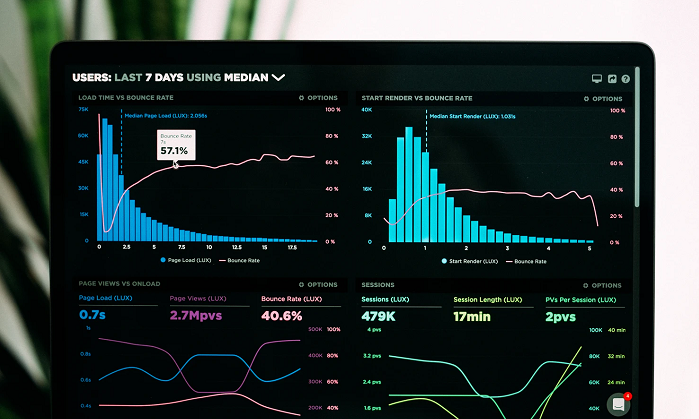Scope Of Data Analytics In India

Table of content
Introduction
How Data Analytics is Transforming Industries in India
Career Opportunities in Data Analytics
Skills Required for a Data Analytics Career
Challenges to Overcome
A Future Full of Promise
Conclusion
Introduction
India’s booming internet usage has ignited a surge in data creation, making data analytics a highly sought-after skill. This rapidly growing field offers exciting career opportunities across diverse industries, from healthcare and finance to e-commerce and marketing. With the ability to unlock hidden insights from data, data analysts are transforming businesses, driving informed decision-making, and shaping the future of data-driven India.
Why is it growing so much in India?
India’s digital revolution is a major driver. With a booming internet user base and increasing smartphone adoption, India is generating massive amounts of data. This data holds immense potential, but it needs to be analysed to unlock its value.
India’s internet user base has exploded over the past decade, doubling since 2015 and on track to add another 900 million users by 2025. This surge in data generation has fueled a thriving data analytics industry. Companies can now tap into a vast pool of information to understand customer behaviour, optimise operations, and identify new market opportunities.
- According to GlobalData, the global data and analytics market size was set at USD 100.84 billion in 2022.
Here’s how data analytics is becoming crucial in India
- Businesses: Companies are using data analytics to understand customer behavior, optimize marketing campaigns, and improve product development.
- Government: Data analytics helps analyze public service delivery, improve social welfare programs, and even predict and prevent crime.
- Emerging Technologies: Data analytics is the backbone of artificial intelligence and machine learning, which are transforming various sectors in India.
How Data Analytics is Transforming Industries in India
India’s massive data generation, fueled by its booming internet user base, is a goldmine for various industries leveraging data analytics to achieve remarkable success. Let’s delve into specific examples across key sectors:
Banking & Finance:
- Fraud Detection: Banks are using data analytics to analyze customer transactions and identify suspicious patterns in real-time, preventing fraudulent activities.
- Credit Risk Assessment: Data analytics helps lenders assess creditworthiness more accurately, enabling them to offer personalized loan products with optimal interest rates and lower risk.
- Personalized Financial Products: By analyzing customer financial behavior, banks can recommend tailored investment plans, insurance policies, and other products that meet individual needs.
Healthcare:
- Personalized Medicine: Data analytics allows doctors to personalize treatment plans based on a patient’s medical history, genetic makeup, and other factors, leading to more effective outcomes.
- Treatment Optimization: Hospitals use data analytics to analyses patient data and optimize treatment protocols for improved recovery rates and reduced complications.
- Disease Prediction: Data analysis of patient information and public health data helps identify potential outbreaks and predict disease trends, enabling early intervention and prevention strategies.
E-commerce & Retail:
- Customer Segmentation: Data analytics helps categories customers based on their buying habits, allowing retailers to target marketing campaigns more effectively.
- Targeted Marketing: By analyzing past purchases and browsing behavior, retailers can recommend products most likely to interest each customer, increasing conversions.
- Product Recommendations: Data analytics suggests relevant products to customers based on their past purchases and searches, leading to a more personalized shopping experience.
Manufacturing:
- Predictive Maintenance: Data analysis of sensor data from machines allows manufacturers to predict potential equipment failures, enabling them to schedule maintenance proactively and avoid costly downtime.
- Supply Chain Optimization: Data analytics helps optimize logistics by analyzing data on inventory levels, transportation routes, and demand fluctuations, leading to a more efficient and cost-effective supply chain.
- Production Planning: By analyzing data on production processes and customer demand, manufacturers can optimize production schedules to meet market needs while minimizing waste and inefficiencies.
Government:
- Public Service Delivery: Data analytics helps analyze public service delivery data, identifying areas for improvement and ensuring efficient allocation of resources.
- Social Welfare Programs: Data analytics provides insights into the effectiveness of social welfare programs, enabling policymakers to target resources more precisely and reach those most in need.
- Crime Analysis: Law enforcement agencies use data analytics to analyze crime patterns and predict potential crime hotspots, allowing for preventive measures and improved public safety initiatives.
Career Opportunities in Data Analytics
India’s massive internet growth has created a ton of data! This “data rush” means companies are scrambling to hire people who can understand it all. Think of it like a treasure hunt, but the treasure is hidden in piles of information. These “data detectives” are called data analysts and they’re in high demand!
There are different jobs for these detectives, depending on their skills:
- Data Analyst: Imagine cleaning up a messy room and organizing everything. That’s what data analysts do with information! They sort through piles of data, find patterns, and create easy-to-understand reports and charts. (Salary: ₹5 lakhs – ₹12 lakhs per year)
- Data Scientist: These are the super-sleuths of data! They use special tools and coding to uncover hidden secrets in the data. It’s like using a magnifying glass to find tiny clues. They help companies make better decisions based on what they find. (Salary: ₹8 lakhs – ₹20 lakhs per year)
- Business Intelligence Specialist: These detectives translate the clues found in data into plans for businesses. They take the information from data analysts and data scientists and explain how it can help the company grow and succeed. (Salary: ₹6 lakhs – ₹15 lakhs per year)
Skills Required for a Data Analytics Career
The data revolution in India demands a special kind of professional: the data analyst. To thrive in this exciting field, you’ll need to master a unique blend of technical skills and sharp thinking. Here’s a breakdown of the essentials:
1. Technical Skills:
- Programming Languages: Python and R are the go-to languages for data wrangling, analysis, and building powerful tools. Learning these languages unlocks the ability to manipulate data and extract valuable insights.
- Data Visualization: Data is powerful, but clear visuals make it impactful. Mastering tools like Tableau and Power BI empowers you to transform complex data into charts and graphs that tell compelling stories.
- Statistical Analysis: Understanding statistical concepts like averages, medians, and correlations is crucial. This allows you to analyze patterns and trends within the data, making informed decisions.
- Data Wrangling & Cleaning: Imagine a messy attic; that’s data before analysis! Data wrangling involves cleaning, organizing, and preparing data for analysis. This includes removing errors, formatting inconsistencies, and ensuring data accuracy.
- Machine Learning (Bonus): While not essential for all data analyst roles, understanding machine learning can open doors to more advanced opportunities.
2. Soft Skills:
- Communication: Data insights are most valuable when effectively communicated. You’ll need to translate complex data findings into clear and concise stories for both technical and non-technical audiences.
- Problem-Solving & Critical Thinking: Data is like a puzzle. You’ll need the ability to analyze problems, identify trends, and find solutions based on your data analysis.
- Attention to Detail: A single mistake in code or data entry can lead you astray. Meticulous attention to detail ensures data accuracy and reliable results.
- Curiosity & Lifelong Learning: The data analytics landscape is constantly evolving. A curious mind and a desire to learn will keep you ahead of the curve.
3. Bonus Skill:
- Domain Knowledge: Having expertise in a specific industry (e.g., healthcare, finance) can be a major advantage. It allows you to interpret data within the context of that field, leading to deeper and more relevant insights.
Challenges to Overcome
- Data Security & Privacy: Protecting sensitive data is paramount. Robust security measures and clear data privacy regulations are crucial to ensure responsible data handling.
- Skilled Workforce Gap: The demand for data analysts outpaces the current pool of skilled professionals. Bridging this gap requires increased focus on data science education and training programs.
- Data Quality & Integration: Data from various sources often needs integration and cleaning before analysis. Ensuring data accuracy and consistency remains a challenge.
A Future Full of Promise
Despite these hurdles, the future of data analytics in India is bright. Here’s why:
- Technological Advancements: Constantly evolving technologies like cloud computing and artificial intelligence will further empower data analytics capabilities.
- Growing Awareness: Businesses and individuals are increasingly recognizing the value of data-driven decision making, leading to a greater demand for data analytics expertise.
- Focus on Data Literacy: Initiatives promoting data literacy across different sectors will ensure everyone can benefit from the insights gleaned from data.
Overall, the challenges faced by data analytics in India are not insurmountable. By developing a skilled workforce, prioritising data security, and embracing technological advancements, India can unlock the immense potential of data and create a future driven by valuable insights.
Conclusion
India’s data surge has ignited a vast and promising future for data analytics. From revolutionising industries to shaping business strategies, data analytics is transforming the Indian landscape.
This exciting field offers a plethora of career opportunities, with roles like data analyst, data scientist, and business intelligence specialist in high demand. By honing a combination of technical skills (programming, data visualisation) and soft skills (communication, critical thinking), you can become a valuable asset in the data-driven world.
The challenges of data security, skilled workforce gaps, and data quality are not roadblocks, but opportunities for innovation and improvement. As India embraces technological advancements and prioritises data literacy, the future of data analytics is brimming with possibilities.
The data revolution in India presents a golden age for freelance data analysts, data scientists, and business intelligence specialists. The high demand for skilled professionals, coupled with the flexibility of freelance work, creates a win-win situation.Influence your skills and the growing opportunities in India’s data analytics sector to build a successful freelance career and be a part of shaping India’s data-driven future.
Get your data results fast and accelerate your business performance with the insights you need today.



